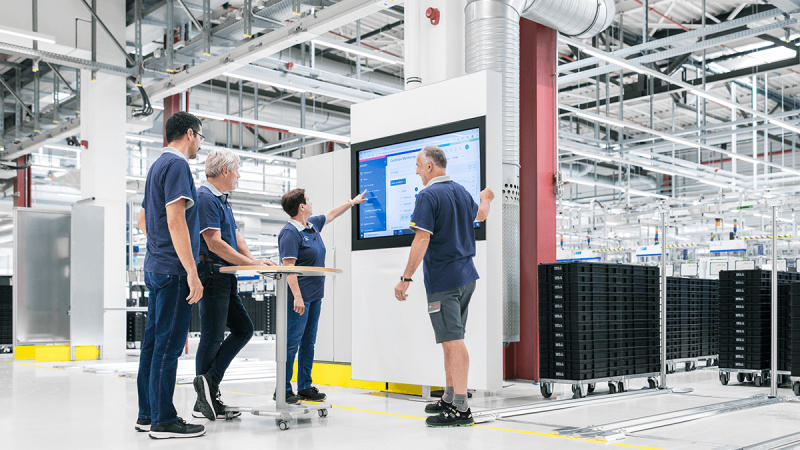8 principles for optimum production
Efficient digital manufacturing without a production system? In a modern factory with its countless complex processes, this is almost inconceivable. Maximum product quality with minimum waste can only be achieved through standardized processes. At the same time, however, strict standards can also slow down manufacturing and make it inflexible – especially since mass-produced goods, manufactured in the same way for years, no longer exist. This makes it even more important for companies to find the right balance between flexibility and standardization – a major challenge for production managers, not only because of constantly changing external conditions. It is vital to constantly compare the target and actual states and to approach the goal of 100% value creation step by step.

The solution: continuous optimization
How might such a step-by-step approach look in practice? At Bosch, we have defined eight core principles for this purpose. They provide the framework for optimal manufacturing and enable continuous optimization towards maximum value creation and efficiency:
1. Pull principle:
only what the next production step or the customer needs is produced, avoiding overproduction and resulting waste.
2. Process orientation:
procedures should always be considered holistically as part of the overall process.
3. Avoiding errors:
preventive measures stop errors from occurring in the first place. This saves costs and ensures the best possible product quality.
4. Flexibility:
adapting products and services to customer requirements in the shortest possible time avoids overproduction and ensures success in the event of unforeseeable market changes.
5. Standardization:
standards define the best solution for the overall process but are not carved in stone: employees therefore evaluate them regularly.
6. Transparency:
in addition to communication, the production processes must also be clearly regulated. The simpler the process is, the faster deviations can be detected.
7. Continuous improvement:
even established and well-functioning processes are not meant to last forever. Only constant evaluation ensures continuous optimization of the overall process.
8. Self-responsibility:
by involving employees in the processes at an early stage, they develop an awareness of competencies, freedom, and motivation – and proactively initiate changes.
Digitalization as a driving force
To be fully effective, these core principles must be firmly anchored in the production process, but above all in the employees' minds. Tools play an important role here – from analog ones such as Kanban to state-of-the-art software solutions. Digitalization has given rise to a wide range of new tools that, when used correctly, can serve as drivers for the step-by-step optimization of production.

Here, too, standardization plays a key role: Only if all data is processed in a standardized way and made available transparently can all employees use it profitably within the context of the overall process. In practice, however, the situation is unfortunately often quite different: a proliferation of non-uniform IT solutions only offers selective assistance on knowledge islands along the value stream. To change this and make digitalization a driver of continuous improvement, the parallel development of production systems and software solutions must become a collaborative project – in compliance with the eight core principles. Find out how this can be achieved in practice in our free white paper.
Get in touch with us
Monday – Friday, 9 a.m. – 4 p.m. CET
